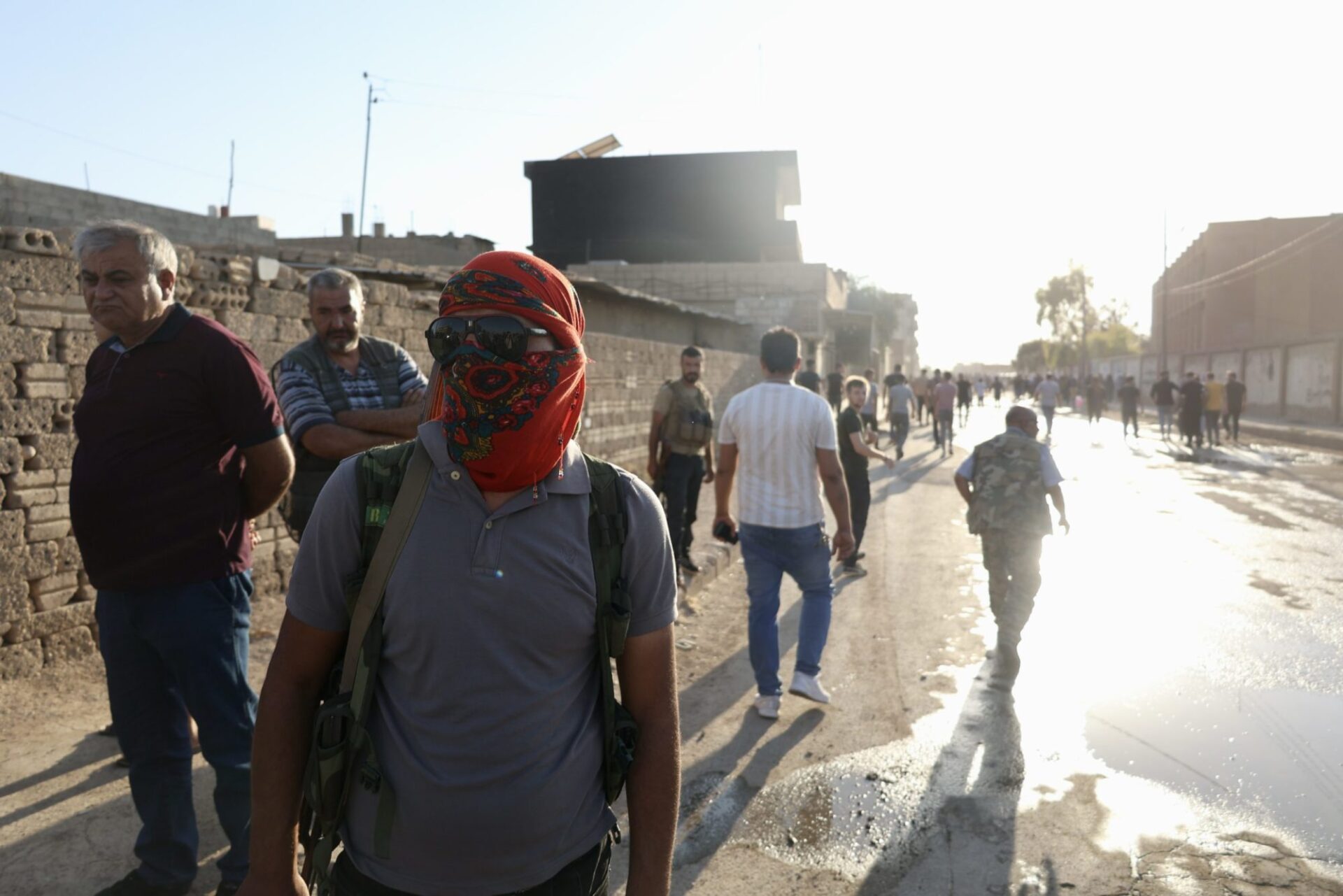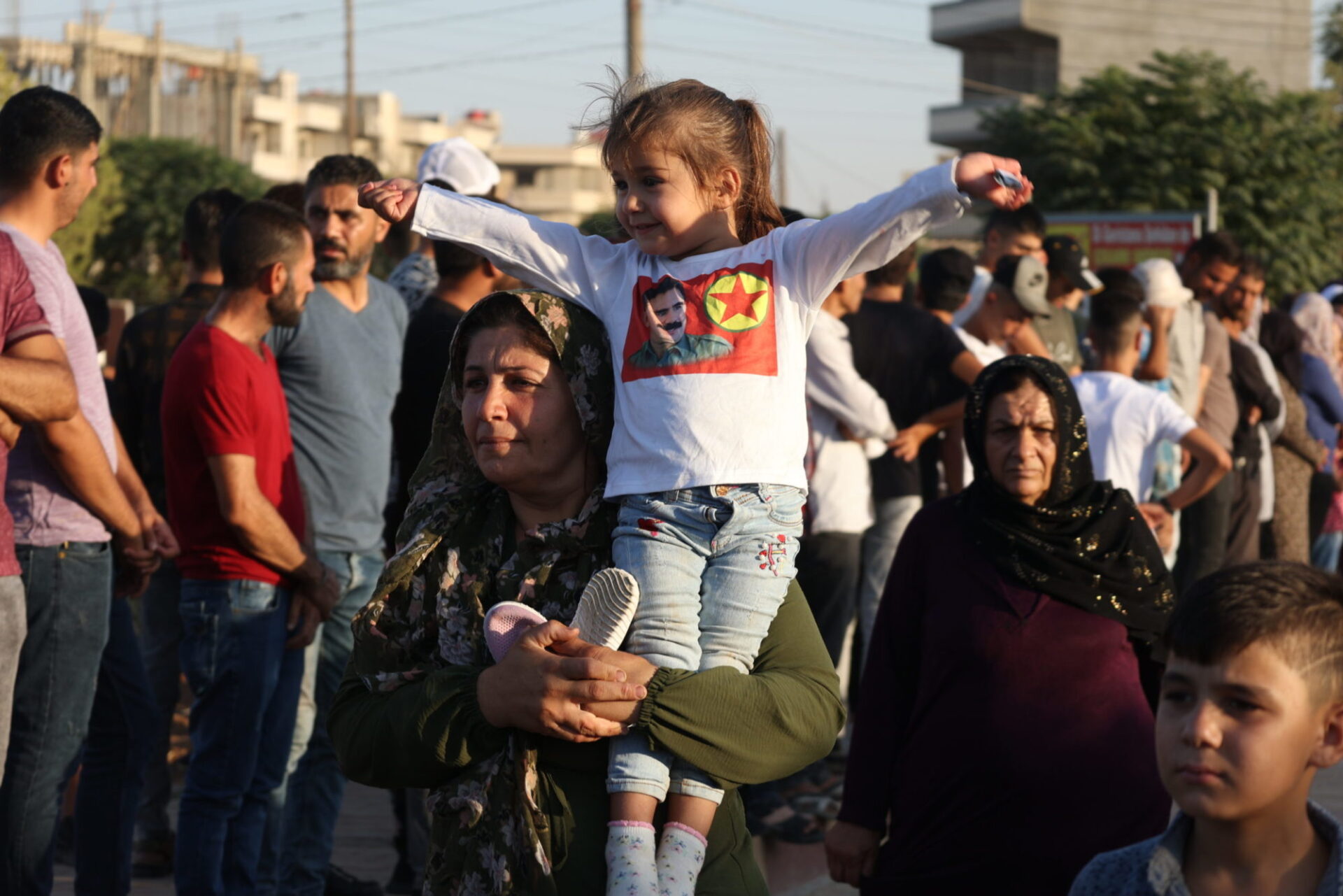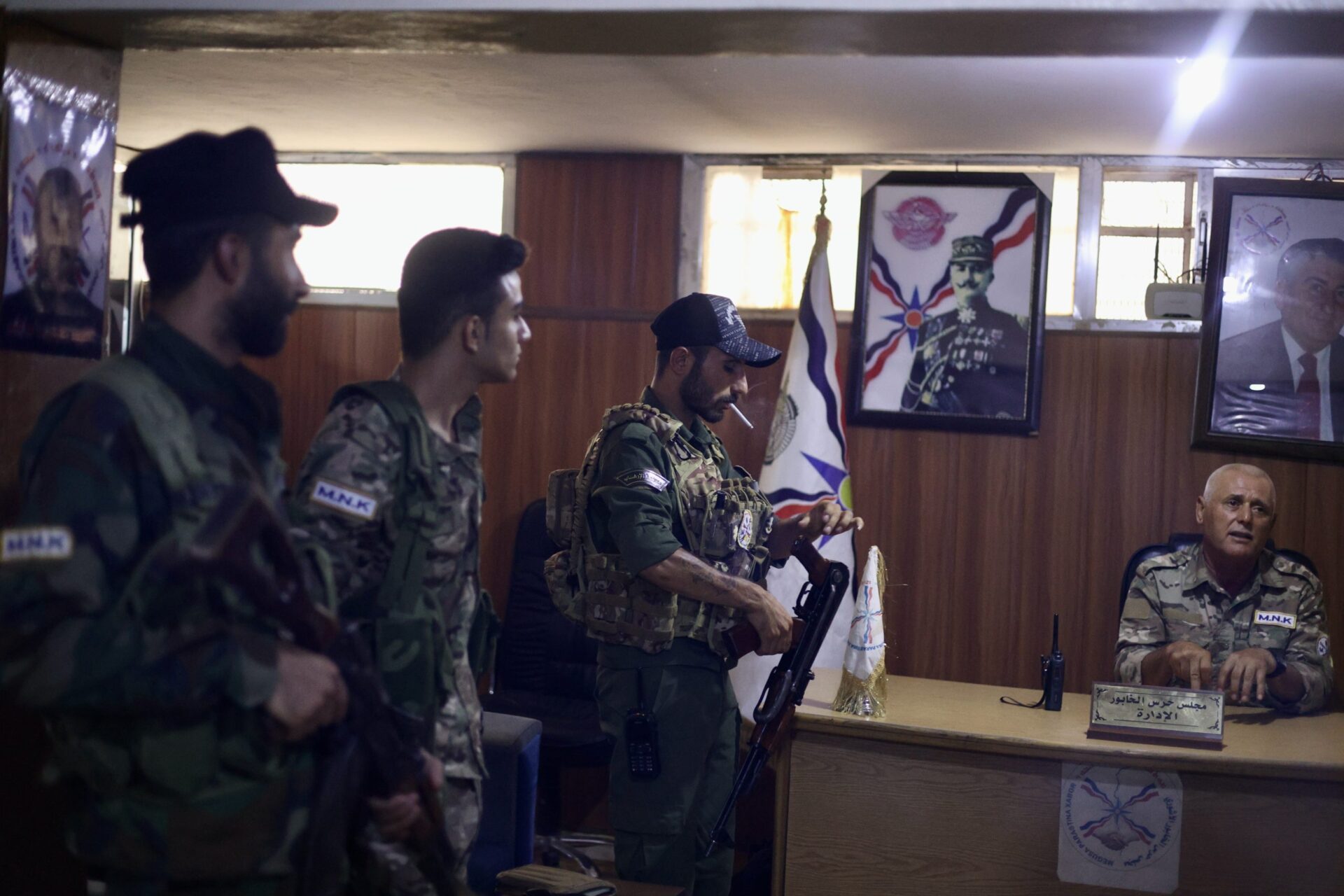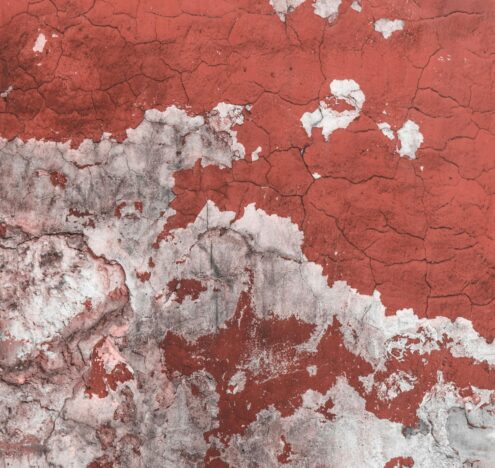Nour hasn’t seen her husband Ahmed in over three years. “He is a civilian. He is innocent. He didn’t do anything. He is 57 years old,” she said. “Why did they arrest him?”
In October 2019, the father of four disappeared as Turkey and its rebel partners invaded northeast Syria to push alleged Kurdish terrorists away from its border and establish so-called safe zones for the resettlement of Syrian refugees. During an interview at her home in the Syrian-Turkish border city of Qamishli in August 2022, Nour wept as she spoke about the fate of her husband. Ahmed’s family believes he was one of the thousands of people who have been detained by Syrian rebels.
The nature of Syria’s 11-year conflict makes it impossible to know exactly how many people have been arrested or forcibly disappeared, but in August 2022, human rights monitors put the number at just over 154,000. During Turkey’s successful capture of a 120 km wide and 30 km deep patch of territory in 2019, rights groups and activists documented a number of human rights abuses, many of which were committed by Ankara’s rebel partners. Abuses included unlawful property seizures, sexual violence, arbitrary detentions, and extrajudicial killings.
Three years on, rights abuses continue. Ahmed and many other Syrians are still missing and Turkey is threatening to launch a fourth invasion into Syria. Turkey’s threats, coupled with its intensified attacks against northern Syria, have prompted backlash from governments and organizations worried about destabilizing consequences and further human rights violations.
DETAINED AND MISSING
After the eruption of Syria’s civil war in 2011, Kurdish forces seized territory in the country’s northeast as the Syrian government focused its efforts on countering rebel groups in other parts of the country. When the Islamic State (ISIS) emerged in 2014, Kurdish forces partnered with ethnic allies to combat a mutual threat, leading eventually to the formation of the US-backed Syrian Democratic Forces (SDF). The armed alliance of Kurdish, Arab, and other ethnic groups came to be one of the most influential players in the conflict as it pushed back ISIS and established a democratic enclave across a large swathe of northeast Syria.
Though not fully independent, the territory and its civil administration enjoy a large degree of autonomy from the Syrian government. Still, the enclave’s fate in a final settlement for Syria remains unclear. A large reason for that has to do with Turkey, which views the territory as a national security threat. While the SDF has proven itself as Washington’s most reliable partner in Syria, Turkey accuses its Kurdish core of being linked to the Kurdistan Workers’ Party (PKK), a guerrilla movement that has waged a decades-long insurgency against Ankara. While the US backs the SDF, Turkey worries that a strong Kurdish presence along its southern border will embolden the PKK.
Citing what it sees as a major national security threat, Turkey has launched multiple operations against the SDF. Alongside Turkey has been the Syrian National Army (SNA), whose formation overseen by Ankara in 2017 brought together a mix of armed groups ranging from the anti-government Free Syrian Army to more radical factions, including Islamists.
Since 2016, Turkey and its rebel allies have launched three military incursions into northern Syria. Turkey’s first operation in 2016, Euphrates Shield, targeted ISIS militants, but it also split territory controlled by Ankara’s Kurdish foes. The following two incursions, Operation Olive Branch in 2018 and Operation Peace Spring in 2019, directly targeted the SDF.
While Turkey delivered heavy blows to the SDF and territory under its control, both operations were “fraught with human rights abuses.” Rebel groups that carried out the operations alongside Turkish forces in particular were charged with extrajudicial killings, pillaging and unlawfully seizing properties, and forcibly disappearing individuals. Such rights abuses continue to occur, even as rebel groups say they have taken steps to crack down on such behavior and hold perpetrators accountable.
Despite the number of Syrians who have allegedly returned or moved to the safe zones, going back can be difficult, if not life-threatening, for some.
Among the myriad actors in the conflict, the SDF and the SNA constitute two of the key actors, specifically in northern Syria. Though the frontlines have largely remained unchanged since Ankara’s last operation in 2019, Turkey and the SNA have waged a steady slow-burn campaign of shelling and airstrikes against the SDF, which regularly retaliates with its own attacks. In the process, both sides have committed human rights abuses. The SNA and other anti-government factions have detained or forcibly disappeared more than 3,800 individuals. The SDF has reportedly detained or disappeared over 4,200 people.
Ahmed’s family believes he is one of an unclear number of Syrians detained by the Turkey-allied rebels around the time of Operation Peace Spring. Some of those detained were reportedly released after ransom payments. Others were transferred to Turkey, where they faced trial and prison.
When Turkey and its rebel allies descended on the border city of Ras al-Ain – known as Sere Kaniye in Kurdish – under the cover of air attacks and shelling in October 2019, Nour and three of her children fled. Believing they would soon return, they left with only the clothes they wore. “We left even our phones there as the air strikes started,” Nour said. Ahmed opted to stay and watch over the family’s home and property. A poor farmer with no ties to local officials, he believed he would be safe.
But he was wrong.
Three days after fleeing, Nour lost contact with Ahmed. A few days later, she received word from a Turkish acquaintance. Ahmed had contacted him and said to tell his family that he had been taken to a jail in Şanlıurfa, a province neighboring Ras al-Ain that holds de facto control over the adjacent Syrian territory.
It is unclear why Ahmed was detained and transferred to Turkey, but Turkish court records provided by Syrian lawyers add an insight into the circumstances and fate of at least 182 other Syrians arrested shortly after Operation Peace Spring. According to one lawyer, who lives outside of Syria and asked to remain anonymous because he frequently travels to Turkey, all 182 detainees were civilians. In Turkish court indictments for 10 of the 15 detainees overseen by the lawyer, the detainees admitted to being members of Kurdish forces, albeit rank-and-file members with mundane assignments who were mostly conscripted into the armed group, sometimes forcefully against their will, or due to financial difficulties.
Despite all being Arab, the detainees were told that if they admitted to being members of the PKK, they would be released, the lawyer said. In their statements, the detainees tended to paint the Syrian Kurdish forces in a negative light, sometimes describing them as terrorists affiliated with the PKK. All were charged by a court in Şanlıurfa with undermining the unity and territorial integrity of the state, membership in an armed terrorist organization, and attempted murder. “These 15 people are wrongly accused,” the lawyer said. “These people are originally Arab and don’t know even one word in Kurdish. How can they be members of the PKK?” Turkish authorities largely failed to provide sufficient evidence for the charges. The lawyer said that the transfer of Syrians to Turkey and trial by Turkish law is also a violation of international law.
Though the detainees state in their indictments that Turkey and its rebel allies treated them well, the lawyer said they endured torture. The lawyer said it was a rebel group called the 20th Division that carried out the detentions. Closely allied with Ahrar al-Sharqiya, a rebel faction sanctioned by the United States for human rights violations and recruiting former ISIS fighters, the 20th Division’s leader, Abu Barzan, is also the former deputy commander of Usud al-Sharqiya, a rebel group that reportedly received support from the United States.
The lawyer said he urged Barzan to go to Turkish authorities to ask for the detainees’ release. After initially denying that he detained them, Barzan agreed to intervene but was ultimately rebuffed by Turkish officials. The matter, Barzan allegedly told the lawyer, was out of his hands. Barzan could not be reached for comment, but in an interview earlier this year he seemed to acknowledge that rights violations had occurred.“Most of the fighters were ordinary civilians before the war began or before they joined the armed groups,” Barzan said during the interview. “They have never received formal training on the rules of war and IHL (international humanitarian law) in particular. So obviously some mistakes have been made by them, which is something that we now are trying to rectify through our engagement with Geneva Call.” Geneva Call, a humanitarian organization that works with armed groups and governing authorities to promote adherence to international humanitarian norms, did not respond to a request for comment.
Out of the 15 detainees that the lawyer handled, he said four were charged with attempted murder and given life sentences. The other 11 were charged with lesser crimes and sentenced to five years in jail. One life sentence was successfully appealed, and the lawyer said he is working to overturn the others as well. At least ten of the detainees have been released on Turkey’s version of parole and are serving the remainder of their sentences in Şanlıurfa province. As for the other 167 detainees, the lawyer does not know about their whereabouts or fate. A lack of funding has prevented the lawyer from being able to follow their cases.
Like those 167, Nour is unsure of Ahmed’s fate.
After learning that he had been imprisoned in Turkey, a year and a half passed before Nour heard from Ahmed again. That time, again through an intermediary, he said he had been moved to another prison in Batman, Turkey. “I’m in jail. I don’t know why,” he said. “Just tell my family I’m alive.”
Nour has not heard from him since.























